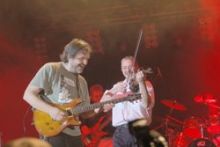“Our music is good music. Our music is very good music. He who loves it is a good person. A very, very good person.” This definition of his own music, far from being overburdened with professional terms, was given by the frontman of The No Smoking Orchestra from Serbia. At the press conference held a few hours before the non-smokers’ gig at Balkanfest, he was sitting next to the celebrity director Emir Kusturica. For the past 10 years, the latter has been taking part in what is announced as “concerts of The No Smoking Orchestra feat. Emir Kusturica”, but in fact is a chimerical semi-postmodern music theater.
Just like a couple of years ago, when the band made its first visit to Kyiv, their gig turned into a queer performance of some unknown Balkan play involving each and every one in the audience: at the frontman’s command, with the people raising their hands or feet like puppets while dancing and the luckiest ones even making it to the stage.
This tongue-in-cheek categorical definition of “very good music for very, very good people” could apply to the tunes throughout the entire Balkan space, thus reducing them to such a simple formula. In reality, the musicians at Balkanfest were essentially very different, even though they created a kaleidoscopic whole.
The 12 Romanians of Fanfare Ciocarlia, as well as Kocani Okrestar, the Macedonian performers from the town of Kocani, suffered from a tangible lack of room. Their music, trapped among the four walls of the concert hall, could not unfold with its innate sweep and power. Both bands looked most organic against the background of mountains, scorched summer air, scented breeze from the woods, highlanders’ faces, and a stage knocked together by some village folks. At least, this is what first springs to mind when you compare the effect from Fanfare Ciocarlia playing at Balkanfest and back at Sheshory Fest – in those glorious days when it was held in the place whose name it bears. This effect of music merging with the environment might be due to the fact that both Fanfare Ciocarlia and Kocani Orkestar are essentially village bands from the Balkan countryside, whose original music identity proved to be in superhigh demand in many parts of the world.
The history of Fanfare Ciocarlia will beat even Cinderella’s hackneyed story. When a German sound engineer and record producer Henry Ernst first arrived at their home village of Zece Prajini in 1995, he knew instantly that he had stumbled across something absolutely unique. On returning home, he sold his property and organized several tours for the newly discovered country musicians.
The name Fanfare Ciocarla sounds rather romantic: in English, it stands for “the Skylark Brass Band”. But romantic does not mean primitive or lacking in mastery. The band has played in 1,000 concerts in more than 50 countries. Their most recent release, Queens and Kings, became the best European album of 2006 according to BBC Radio 3.
The Balkan music is among those most suitable for cinematography, which is why Fanfare Ciocarlia were engaged in several films, in particular, Head-On by the Turkish director Fatih Akin, winner of the Golden Bear at the Berlinale.
Due to the same organic peculiarity, the Macedonians of Kocani Orkestar also felt a lack of room for their music. Their dominance among the lovers of Balkan art started from the already mentioned director Kusturica’s Time of the Gypsies. Kocani Orkestar is known for being inspired by Turkish military bands of the 15th century, when the Balkans were occupied by the Ottoman Empire. Oriental motifs in their music are attributed to Gypsy and Latin American influences.
The cheerful and romantic atmosphere, so typical of the Balkan music performances, might leave one with an impression that this music is somewhat shallow. However, this would be a terrible mistake to think so. Only virtuosos can survive at this music carnival owing to their excellent sound and ability to create what can be defined as “visual music.” It is this prominence given to the image and the show that makes The No Smoking Orkestra and Gogol Bordello so distinctive from their Balkan “brothers.”
However, Gogol Bordello will not tolerate any ready-made phrases to describe their style, brewed on the music chaos of New York City. Their leader, Eugene Huetz, spoke straightforwardly against any definitions.
“Gypsy Punk is just the name of our album, not a style in music,” said he. “The term just appeals to all of us; that’s why it’s come to stay. It was invented by my Gypsy friends from France. Both the name and its music suggest quite a surrealistic, rather than literal, perception.
“That’s why it’s useless to be obsessed with details, like if it’s punk or non-punk. First and foremost, it’s a kind of music that has transcontinental bearing. It’s no more Ukrainian and Gypsy than it is Brazilian and Vietnamese. When our band became popular in the West some seven or eight years ago, and when we started to gain recognition in Eastern Europe, people over here began to think that our success is related to our being ‘dudes in striped sailor shirts’ and that anyone who wore a sailor shirt and smoked cigarettes was totally cool and would soon be famous all over the world.
“In reality, things look a bit different. All these ideas about Eastern European stuff being all the rage worldwide are total rubbish. The West is long past admiring the Soviet exotica, and no longer cares for those hammers and sickles.”
For Huetz, Balkanfest is, first and foremost, about a triumphal return home. As The Day has already related, he is a Kyivite, who at one point in time emigrated to the US. There he gathered a multiethnic band, Gogol Bordello, which for almost 10 years has existed in the worldwide, rather than local, dimension.
The last time Gogol Bordello was in Kyiv was back in 2003, when they gave a club concert here. Of course, it was on a much smaller scale. Gogol Bordello had to wait six more years before they were invited here again – on quite a different level.
“Kyiv is terrific. This time I feel like I had hit the right pocket,” said Huetz. “The emigrant perception sometimes makes one have this paranoid double feeling on their return home. I’ve been missing this place. Yet, if you drilled a hole in the globe, you could perhaps get to Brazil. The distance has been so great from Kyiv that I’m becoming nostalgic...
“On the other hand, there are certain incidents that have really gotten my goat. For some obscure reason, Ukraine always tends to be the last country to invite our band on tours. Frankly, this gig doesn’t have any critical importance for our career because our major audience is out there in the West. But for human reasons, because I was born here, it makes me feel a bit resentful. I think it’s due to the fact that rock music was never able to rise as high here as it did in the West. Here, one still looks up to pop stars, total trash and bull, senseless and stupid waste of everyone’s time. This is the sad heritage of the Soviet time.”
We were lucky to see Gogol Bordello perform under different skies. However, our expectations for a very special concert in Kyiv were not in vain. It looked as if Huetz, who has won worldwide renown but is still unclaimed at home, had been waiting for this moment of triumph for ages — waiting to see Ukrainians, rather than Brits, Americans, or the Japanese, raving in the fan zone. At least, this is the impression I got as I gazed at this 37-year-old from Rio de Janeiro holding a Ukrainian flag. Yes, he has been waiting for this moment. Just like us.
P.S. In a hallway of the Palace of Sports I bumped into Lilia Pustovit, a fashion designer. It turns out that she and Huetz are almost relatives. This cosmopolitan world is very small indeed, and Rio isn’t that far from Kyiv – especially if one ventures to drill a hole in the globe...









